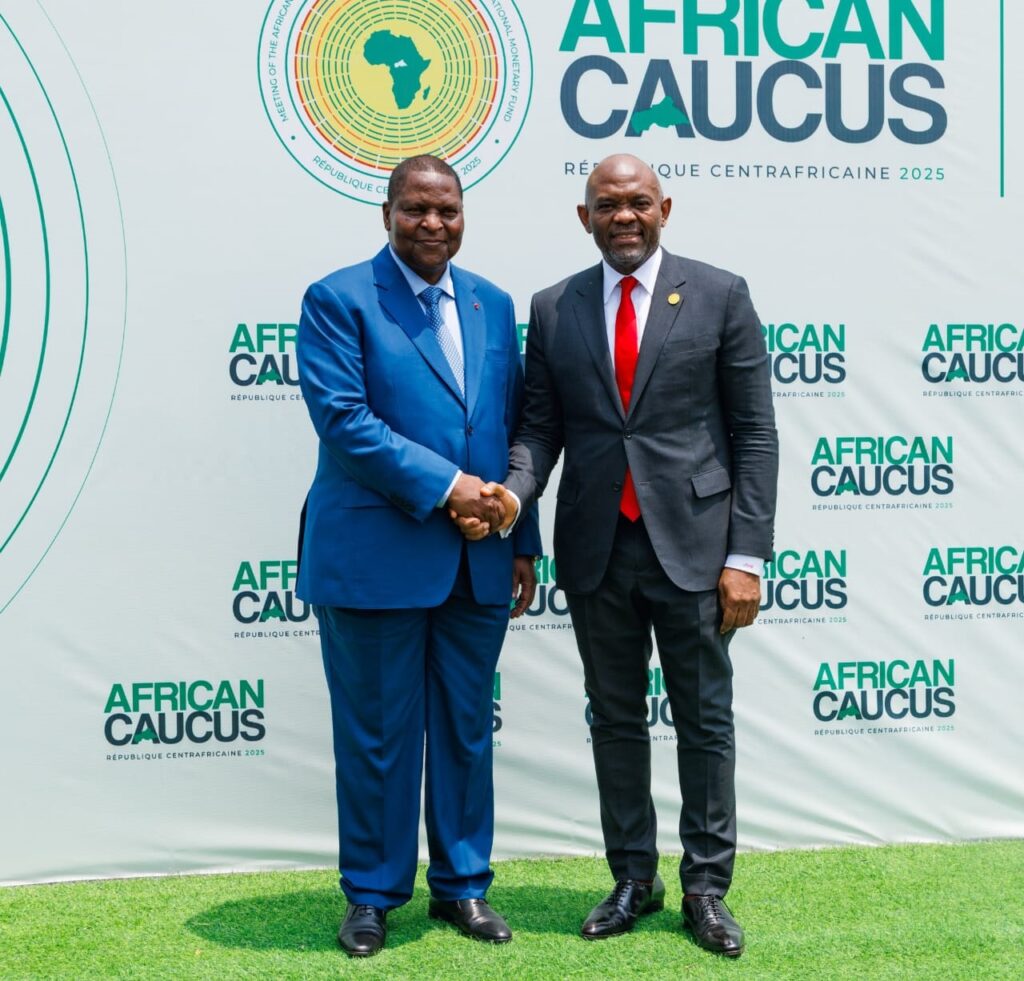
Caption: President, Central African Republic, Faustin-Archange Touadéra (left) and Group Chair, United Bank for Africa Plc and Heirs Holdings/Founder, Tony Elumelu Foundation, Tony Elumelu in Bangui on Thursday..
Tony Elumelu, chairman of UBA Group and Nigerian conglomerate Transnational Corporation, on Thursday was guest at the African Caucus Meeting of World Bank and International Monetary Fund in Bangui, Central African Republic, where he advocated various measures to help development the African continent.
In his keynote speech titled, “Resilient Infrastructure, Human Capital, and Green Assets,” he challenged African leaders to take development of the continent as a responsibility, knowing that “no one else will do it for us. Africa’s future is in our hands. No one will build this continent for us. We must lead.”
To achieve this, he said “power is everything. No industrial revolution can happen without electricity. We must prioritise energy. Without power, there can be no progress.”
Invest in the continent’s youth population, he warned, is a must, because “they are not just our future – they are our present.”
For him, the time has come to amplify Africa’s voice and shape a development path that reflects our unique needs and aspirations.
Elumelu, originator of the Africapitalism concept, told the gathering comprising Ministers, Central Bank Governors, and representatives of the IMF and World Bank, lamented that the “global community has not always served African interests, (or) ensured that Africa’s voice is heard or delivered for Africa.”
Africa’s voice, he believes, not only needs to be heard, but has to be heard, given that she has “solutions to so many of the world’s problems.”
For example, he said, Africa’s “young people are the answer to the world’s demographic crisis, our minerals power the extraordinary technological changes we are experiencing, our fields can feed the world.
“These African solutions, this African opportunity, must be on African terms, benefit African people, catalyse true value creation on the African continent. And it must be based on true partnerships, partnerships of equality and mutual respect.”
Not leaving the problem solely at the doorstep of the global community, Elumelu, founder of the Tony Elumelu Foundation noted that African governments must in reality do better.
If the current generation is to deliver “that opportunity to our next generation – and if we are to be truly heard in the community of nations, Africa needs to step up.
African’s deep and persistent infrastructure gap, ranging from roads to ports, power to internet connectivity, he said must be addressed to lay the foundations of modern development, or unlock the growth and prosperity her people deserve.
To bridge this gap, he challenged African leaders to strengthen fiscal capacity, drive efficiency and “unlock innovative financing – especially by inviting and enabling private sector to co-lead infrastructure development.”
Energy access remains the continent’s biggest enabler, or barrier to her progress, especially as up to 70% of her people lack electricity, with Nigeria, Africa’s most populous generating less than 7,000 megawatts for her over 200m people.
With such insignificant capacity, he said: “if we are to industrialize, create jobs, and participate meaningfully in the global AI revolution, we must invest aggressively in energy — from renewables to cleaner gas-based solutions.
“Imagine what Nigeria’s economy could become with 100,000 megawatts of reliable, affordable energy. That is the scale of transformation we need. And the story is not different across Africa,” he added.
He called for private sector investment, noting for example that his group’s investments in Transcorp and Heirs Energies, is help “to solve this challenge – generating power, exporting it through the West African Power Pool, and using gas from our oil operations to power our plants. This is Africapitalism in action: private capital solving public challenges.
“Africapitalism is the belief that the African private sector must take the lead in driving economic development. It is about long-term investments in key sectors that create both economic returns and social impact,” he stressed.
Urging for strong partnerships, he stressed further, that “governments must create the right environment. Private sector must bring capital and innovation. And our development partners must support Africa’s realities – including recognising gas as a viable transition fuel on our path to clean energy.”
He also made case for investment in human capital development, especially her Africa’s young population with over 60% of our population under 35, which is both her greatest asset and greatest risk.
The youth, if empowered, he assured, can transform Africa, just as it can become a source of instability if neglected.
With this in mind, he said his Tony Elumelu Foundation has empowered over 24,000 young entrepreneurs each with a non-refundable seed capital of USD5,000, across all 54 African countries; while training 1.5m youth and catalysing 1.2m jobs as the various beneficiary-entrepreneurs creating jobs, building businesses, and changing lives.
Building a resilient and inclusive Africa full of opportunities is achievable, he said, by working across public and private sectors, and in partnership with institutions like the IMF and World Bank.
He commended the growing focus of global institutions on Africa and the emphasis on job creation as a path to lasting growth, just as he applauded the ‘Mission 300’ initiative of Ajay Banga’s World Bank which is an ambitious goal to connect 300 million Africans to power.











